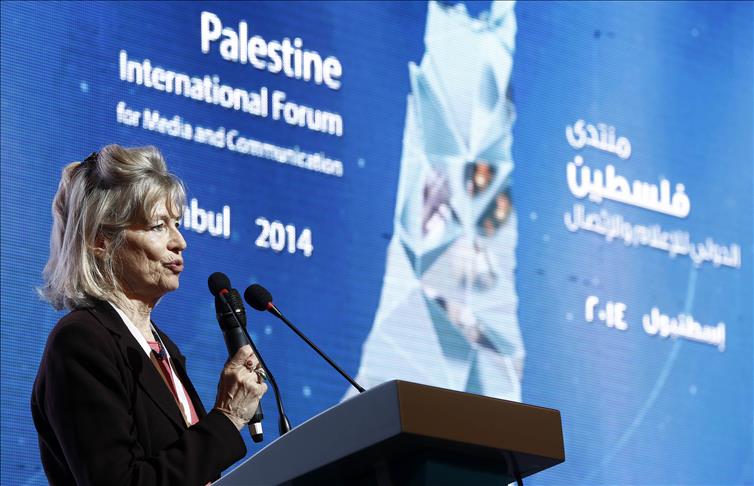EXCLUSIVE: New Palestinian media may change middle-east story
A new generation of Palestinians are opening new media outlets and beginning to influence major outlets like the New York Times and the Guardian, says an experienced British journalist

By Sare Selvi Öztürk, Turgut Alp Boyraz
ISTANBUL
Western media used to follow Israeli media directives, but this pattern is about to change with the influence of new media that emerging with the help of technology, British journalist Victoria Brittain told the AA on Thursday.
Brittain, former associate foreign editor of the Guardian, told an AA reporter in a forum about media in Palestine held in Istanbul, that a new generation of Palestinians, both those living in the occupied territories and those attending universities in the West, have started new media outlets.
"They are beginning to influence not only local media, but also major outlets like the New York Times and the Guardian. Electronic Intifada and Huffington Post are two good examples of these media outlets founded by individual initiatives," said Brittain.
She added that she is optimistic about the future of media coverage of the Israeli-Palestine conflict, although she added, "We have yet to see the impacts of new media on the political level."
Electronicintifada.net was founded by Ali Abunimah, an American citizen of Palestinian descent in 2001, and aiming to balance pro-Israel new outlets which founders exist in Western media.
Alain Gresh, a prominent French writer and journalist, said he supports the Palestinians not because they are morally superior, but because they have been oppressed by Israel and they don't have opportunities to express themselves.
"I am not saying everything is perfect in terms of press freedom under the Palestine Authority or Hamas-led Gaza. Being a supporter of Palestinian cause doesn't make me say that. We have to see both sides of the story," said Gresh.
Gresh said that Israel is not always able to influence the U.S. despite their powerful influence. "Some time people say Israel is the puppet of US. When US take a strategy decision like Iranian negotiations Israeli lobby was not able to pressure on U.S.," Gresh explained.
Daud Abdullah, director of the London-based website Middle East Monitor, said America has to be more balanced and fair, to support the rule of international law in the Israel-Palestine conflict.
"America should not be Israel's advocate in this process, although it has been acting in this way. There must be more partners involved. The European Union is absent in the political process, although it finances the authority in Gaza, keeps them going and supports humanitarian projects in Gaza," Abdullah said.
While rival Palestinian factions Hamas and Fatah have agreed on Wednesday to form a national unity government, Abdullah suggested that the Palestinian Authority (PA) should reassess the strategy, adding that it can’t depend on negotiations as the only method to resolve the conflict.
"It must have other cards on the table like resistance against the colonizer. Resistance has to be on the table as a means to maintain pressure. Political negotiations are not useful and can’t be the only method, especially when you have a party that is politically stronger than you and backed by international powers like Europe and America," Abdullah said.
englishnews@aa.com.tr
Anadolu Agency website contains only a portion of the news stories offered to subscribers in the AA News Broadcasting System (HAS), and in summarized form. Please contact us for subscription options.

